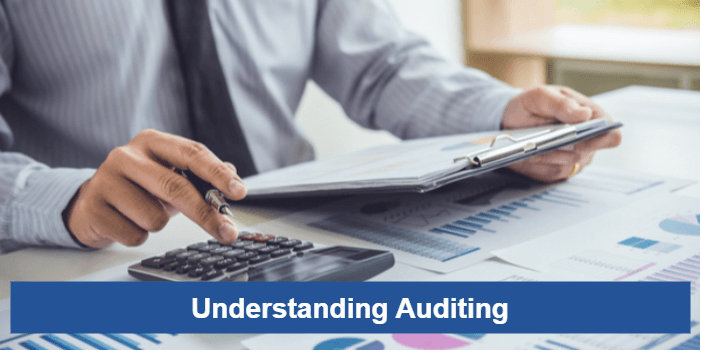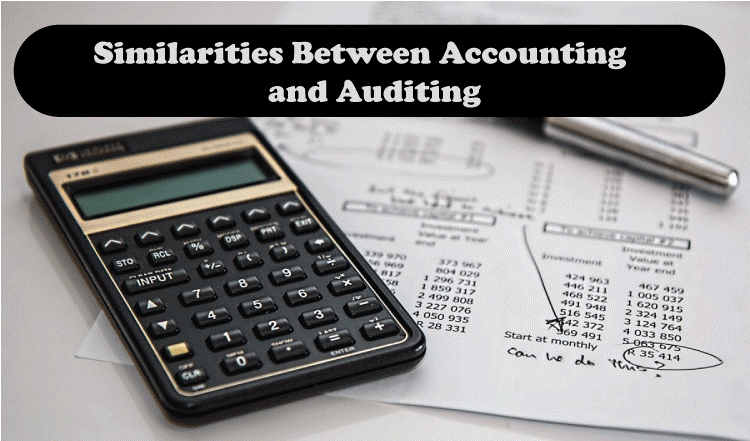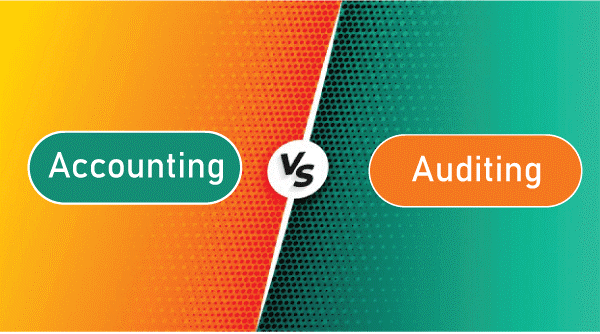Accounting vs. Auditing: What's the difference?Accountants and auditors must be assured of the accuracy and consistency of a company's financial accounts. Financial statements, including balance sheets, income statements, and cash flow statements, are created by accountants. They might also carry out additional duties, including bookkeeping, managing expenses and income, predicting earnings and cash flows, and tax preparation. Accountants may be employed by a business or used by outside contractors. Contrarily, auditing is a procedure that entails checking the correctness and compliance of a company's financial records with numerous regulatory requirements. The auditors are unbiased experts who analyze the financial statements and give a fair judgment of their trustworthiness and accuracy. A company's financial health and integrity are ensured through auditing, and stakeholders have faith in the financial statements of the firm. Accounting and auditing are both essential for any company. Hence, it is important to know about each and the notable differences between them in order to understand both approaches better and decide on financial strategies accordingly. AccountingAccounting is the process of documenting, categorizing, and compiling a person's or a business's financial transactions. Accounting's primary goal is to gain financial data that may be utilized to generate financial statements, compute taxes, and make business choices. Accounting has many subfields, such as tax, management, and financial accounting. 
Becoming an accountant is a common career choice for those with an analytical mind who desire to work with corporate or personal financial data. An accountant is commonly called upon by a chief financial officer (CFO) or a firm's finance department to assist them by doing in-depth analysis and accurate reporting on financial records. Before completing tax returns for either individuals or firms, accountants also meet one-on-one with taxpayers to review financial records. Individuals with accounting training can work independently in their own firm, or independently for a small, medium, or large company in the public or private sector, as a consultant to enterprises or non-profit organizations, or as an independent contractor. With a keen interest in finance and precise details, accounting experts can create financial reports in a variety of contexts to be used for various purposes. For instance, an accountant might discuss the present financial state of a person or a corporation. Authorizations are essential for accountants and financial analysts. A recognized professional certification may be required for entry-level accounting positions, but growth depends on performance. Simply put, the most obvious path for someone who wants to be an accountant in the future is to earn an accounting degree. Each career option has a dominant professional qualification. The American Institute of Certified Public Accountants confers the title of Certified Public Accountant on accountants, which is obtained through the Uniform Certified Public Accountant Examination. This professional designation is, without a doubt, the most well-known and respected position in the financial industry. AuditingThe integrity and correctness of a company's financial information are crucially dependent on auditing. To ensure that a company's financial records adhere to the necessary accounting standards and laws, auditing entails thoroughly examining those records, including financial statements, accounting systems, and internal controls. An impartial and objective third-party auditor independent from the company usually performs this process. 
The main goal of auditing is to guarantee to stakeholders the accuracy, completeness, and transparency of a company's financial statements. Under this approach, auditors verify the accuracy of financial data, such as revenue, expenses, assets, and liabilities, and ensure that it has been recorded properly. In order to discover potential flaws or opportunities for improvement, auditors also evaluate a company's internal controls, ensuring that they are based on the rules and guidelines that dictate how financial transactions are documented. Stakeholders, including investors, creditors, and regulators, can utilize the findings of an audit to adjust their choices regarding the state of a company's finances and future prospects. If the auditor issues a positive and fair audit opinion, which indicates that no material misstatement of the financial statements has been detected, the stakeholders can have confidence in the company's financial reporting. On the other hand, a qualified audit opinion might cause worry about the company's financial reporting and impact shareholder decisions because it indicates that the auditor has found one or more problems with the financial statements. Similarities between Accounting and Auditing
Financial reporting is strongly tied to the allied disciplines of accounting and auditing. Although both include a company's financial data, their goals and methods are distinct. But there are many other things that accounting and auditing have in common. They are:
The focus on financial records, the use of GAAP, financial statements, the requirement for professional knowledge, and adherence to ethical norms are only a few parallels between accounting and auditing. Both professions are crucial to maintaining the public's confidence in the financial reporting process and assuring the quality and dependability of financial data. Main DifferencesThe skill sets required are often similar, and a similar talent pool exists for accounting and auditing. Nonetheless, there are slight differences. Accounting involves someone more focused and detail-oriented. Millions of dollars can be lost due to minor mistakes, mainly when large corporations handle massive sums of money. If an auditor arrives after you and discovers issues, it will not be suitable for your reputation as an accountant. Auditors must value correctness while also possessing solid investigative skills. 
Together with genuine errors, a qualified auditor must be able to detect deceit, fraud, and intentional misstatements. An auditor's magical investigating skills are crucial since the companies participating in such filth are frequently skilled at disguising it. Despite their similarities, accounting, and auditing have different objectives and employ other procedures. The following are the primary distinctions between accounting and auditing:
Let us now discuss the notable differences based on various aspects, such as: 1. EducationPlan to obtain at least a bachelor's degree if you want to excel in accounting or auditing. Although there are no set educational prerequisites for either industry, and both employ successful people without a college degree, these people are the exception rather than the rule. At some time, the majority of senior accountants and auditors take and pass the Certified Public Accountant exam. This requires 150 hours of postsecondary education, almost a master's degree, and more than a bachelor's degree. The four big accounting firms?PricewaterhouseCoopers, Ernst & Young, Deloitte, and KPMG?prefer their new hires to have already passed the exam or, at the very least, be eligible to sit for it. Most recent accounting graduates who want to work for one of these firms should have passed the exam. 2. SkillsNumbers skills are needed, especially for auditors and accountants. It is not essential to have a working understanding of multivariate calculus because the majority of maths work is done on calculators and spreadsheets. Nonetheless, experts in these domains must be quick and at ease with quantitative analysis. For those who frequently make mistakes and quickly become confused when working with numbers, both careers will be frustrating for them. The notion that "people who prefer the company of numbers than people end up in the accounting field" is outdated and false. Management consulting is one of the many careers that fall under the broad umbrella of accounting. This field requires energetic, outgoing individuals who can establish rapport with C-suite executives and deliver confident presentations to board directors. Furthermore, accountants and auditors often work together to execute responsibilities, including developing and analyzing financial records, monitoring inventories, and forecasting future sales. 3. Beginning SalaryEntry-level accountants and auditors earn a variety of salaries. Your region, employer size, and degree of education will all impact where you fall on this band. As of 2021, the Big Four companies' range for new accounting and audit associates is between $40,000 and $80,000, subject to various factors. The Big Four firms created the industry's remuneration norms. Apart from this, keep in mind that starting pay in the accounting and auditing industries is very negotiable; if you have several job offers, you can use this as leverage to bargain for higher compensation with your preferred business. 4. Job ProspectsThe government combines accountants and auditors when estimating career growth, and the outlook is positive. The Occupational Outlook Handbook published by the Bureau of Labor Statistics (BLS) projects a 4% increase in demand for accountants and auditors between 2019 and 2029. The economy's overall health and the accounting workforce's growth are strongly intertwined. Suppose the economy faces a severe recession or a protracted period of stagnation. In that case, the need for accountants may decrease in the coming years, but if economic growth is higher than predicted, the requirement may increase. Comparison Chart
Accounting vs. Auditing: Which one should I pick?For an ambitious, meticulous, and numerically-minded fresh graduate or young professional, it is always difficult to go or choose between accounting and auditing for future career prospects. Subtle variances will likely influence your career choice in your personality and interests. If creating things out of piles of raw numerical data sounds like a fun way to spend the day, you may consider a career in accounting. If, on the other hand, you find excitement in examining someone else's work for errors and inconsistencies, an auditing career may help you achieve your aim. Both career paths provide a high-income potential, above-average work security, and a variety of progression chances that should not be overlooked. The Bottom LineAccounting and auditing are separate but related professions essential to a company's financial management. While auditing is checking and verifying financial records to ensure their accuracy and completeness, accounting is concerned with creating and interpreting financial statements. All fields demand specific knowledge and skill, but their goals and methods are distinct. Although auditing focuses on confirming the correctness of the information, accounting concentrates on presenting financial data. In the end, accounting and auditing are both crucial for assuring the dependability and correctness of financial records and preserving the public's confidence in the financial reporting process. Businesses and individuals working in financial management should be aware of the differences between these two disciplines.
Next TopicAccounting Software
|
 For Videos Join Our Youtube Channel: Join Now
For Videos Join Our Youtube Channel: Join Now
Feedback
- Send your Feedback to [email protected]
Help Others, Please Share










